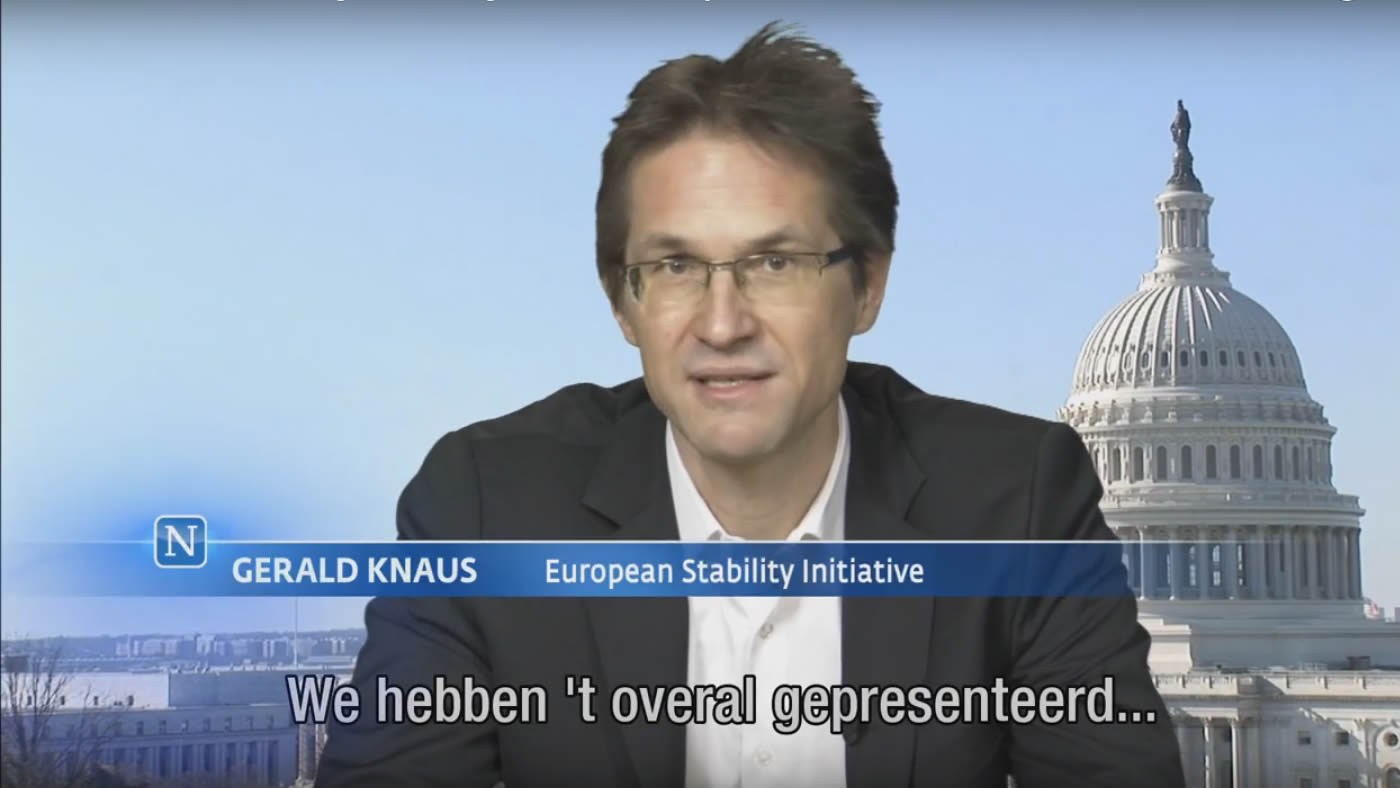Also available in Turkish:
06 Mart 2016 Tarihli Davutoğlu-Merkel Buluşmasında Ne Oldu?
There has been a lot of speculation about the (allegedly) surprising, for some even shocking, proposal Turkey made on 6 March in Brussels at a meeting in the evening at the Turkish embassy between Ahmet Davutoglu, Angela Merkel and Mark Rutte, on the eve of the European leaders discussing refugees with Turkey on 7 March. EU Observer wrote:
“The bombshell came during lunch when a new plan, to the surprise of many EU leaders, was put forward by Davutoglu. Only a handful had previous knowledge of the plan, and only a few moments before. It appeared that the plan – the quid pro quo mentioned above – has been discussed by Davutoglu, Merkel and Dutch prime minister Mark Rutte on Sunday evening at the Turkish EU mission in Brussels.
A source close to Merkel now says that she discovered the plan at the meeting and only discussed it with Davutoglu and Rutte to make it workable. But for most of the participants who discovered it on Monday, she was the brain behind the Turkish paper. “Stop saying it’s a Turkish plan, they haven’t written it,” an angry official from a small member state told a group of journalists.”
In fact, the official quoted here (and many others, including European leaders such as French President Francois Hollande) was wrong.
Turkish officials had discussed ideas similar to those Davutoglu presented to Merkel and Rutte – which were public since September 2015 – for a long time; ESI reports developing these proposals had been translated into Turkish many months before; and ESI analysts have presented these ideas in Istanbul and Ankara numerous times. In early 2016 we made another concerted effort to promote these ideas in Turkey. At the end of February we sent a series of letters to Turkish officials and ambassadors, followed by more meetings, arguing that it was in Turkey’s interest to adopt the Merkel-Samsom Plan. Letters like this one:
29 February 2016
Dear … ,Please find a short paper with ideas, following up on the things we discussed. I hope it is useful.Those in the EU who say Merkel has to give up on her idea to work with Turkey are growing stronger. Merkel remains strong in Germany. If there is a real breakthrough in the next days and weeks she could retake the initiative in Europe – but only if joined by Greece and Turkey. This would benefit refugees, a liberal EU, and Turkey all at the same time.One additional issue we discussed was the paragraph in the paper “Key elements of a resettlement/humanitarian admission scheme with Turkey” that was not agreed upon yet. It would be much better to have a direct link to readmission from Greece, like this:“The Member States participate in voluntary resettlement on the assumption that Turkey fully implements the existing readmission agreement, agrees to be considered a safe third cojntry by Greece, and that it will cooperate with Greece and the EU efficiently and speedily.”These are not subjective criteria; they would depend on Turkey – assuming that Greece is helped now to handle readmission.It would be great to talk soon. Lets hope the next week brings a breakthrough. The key for this lies in Berlin and Ankara.Best wishes from Istanbul,Gerald Knaus
Together with such letters we sent policy makers the following short paper with concrete suggestions:
Suggestions for the Coalition of the Willing and Turkey
European Stability Initiative – 29 February 2016
There is a dramatic loss of trust around Europe in current policies on the refugee crisis. However, all the alternatives to close cooperation with Turkey –reducing the refugee flow in the Balkans as decided at the recent Balkans summit in Vienna or pursued already for a long time by the Visegrad group led by Hungary – will not work. Failure only benefits the illiberal, pro-Putin, anti-refugee and anti-Muslim coalition across Europe.
There is a need for a strategy that:
– turns a chaotic and disorderly process into an orderly one,
– supports Turkey immediately through humanitarian resettlements
– supports Greece for it to be able to readmit people to Turkey,
– gets a commitment from Turkey to accept readmitted people speedily from Greece,
– observes international, European and national legislation on refugees.
What has to take shape in March
– A process of orderly resettlement of Syrian refugees from Turkey, beginning in March, of 900 a day, every day (27,000 a month, 108,000 in four months, 324,000 a year). This will continue for the foreseeable future – like the Berlin airlift, which had no end date.
It is crucial that this process begins in March. The fewer intermediaries are involved, the better. Each nation that participates should examine its own legal provisions, see how they can be adapted to this emergency, and how soon they will be able to take people. The perfect is the enemy of the good.
Reach agreement with Turkey that 900 a day for a year is the target but also the minimum goal; if there are further huge waves of refugees in the future from Syria it may be extended. It is a floor, not a ceiling.
– Readmission to begin, ending the movement along the Western Balkan route in the Aegean. Turkey to commit to take back (in principle) everyone who reaches Greece after the day on which the first group of 900 is resettled from Turkey.
Change the incentives for refugees. Readmission from Greece to Turkey and relocation from Turkey will make the crossing of the Aegean pointless and redundant. The better and faster it works, the less people Greece and Turkey would need to deal with four months from now.
What is needed:
– Greece prepares where to hold and process any claims of those to be returned to Turkey.
Setting ambitious/realistic goals, in a permanent working group supported by the coalition of the willing and with Turkey present. Can Greece manage to return all North Africans immediately in March? Can it do the same for all Pakistanis? And some from other groups for maximum impact?
– Strong and simple communication: “Greece considers Turkey a safe third country. Turkey accepts that it is a safe third country for Greece. Your asylum applications will be declared inadmissible. Do not risk your lives, or the lives of your children.”
Very important: images of significant numbers being returned from Greece to Turkey; and of people returning from Turkey to their home countries.
– Turkey does not want to readmit Syrians.
Agree instead that until the summer Greece will not send back Syrians. Then, by the summer, once Ankara (and Syrian refugees) see that the resettlement to the EU is serious and substantial Turkey will start taking back also Syrians. Turkey will want to first see that the EU does help with Syrian refugees directly and in a substantial way. This will coincide with visa free travel in place for Turkish citizens.
– Greece does not have the capacity to hold people and to process the asylum claims of those who decide to make one in Greece instead of being returned right away. This has to be build up.
– Turkey and Greece need to review the protocols and practices of their existing readmission agreement (for instance: it seems that the “accelerated procedure” of 7 days for Turkey to deal with Greek claims is only applicable to the land border; the normal procedure is 75 days. It should be 5 days for every case; etc.).
– Turkey and the EU need to develop a strategy to provide incentives to as many as possible of those who are returned to go on and return voluntarily to their home countries – vouchers for North Africans and Pakistanis to fly back right after they return to Turkey, etc …
– For those who decide to then apply for protection in Turkey and become asylum seekers there: Turkey needs to be ready to deal with this. And should get immediate support to build reception facilities.
Some issues to address
TURKEY: committing to larger and faster readmission from Greece is not easy politically. The history of negotiations over the Turkey-EU readmission agreement testify to this. And yet it is crucial: no resettlement is sustainable without such control in the Aegean.
There is, however, more that the EU can do to help Turkey – and convince the Turkish public:
– The European Commission begins right away the process of lifting the Schengen visa requirement for Turkey, launching the process to amend regulation 539/2001. This legal process always lasts a few months.
But the EU should hold out a concrete promise to Turkish citizens with concrete dates:
“If Turkey implements the existing readmission agreements with Greece in full and agrees to take back all new arrivals from 15 January 2016 and implements all requirements from the visa roadmap concerning the rights of refugees and asylum seekers in Turkey until 30 April, Turkish citizens will be able to travel without a visa to the EU as of June 2016.”
If this is backed by the Commission and Germany and others, this would be a powerful signal.
This should be targeted at the two key requirements Turkey must meet:
fully implement the readmission agreement with Greece,
be a safe third country and fully implement its 2013 law on foreigners.
There is no good reason at all to either link visa liberalisation to the EU-Turkey readmission agreement (rather than to effective readmission from Greece) or to delay it until October. The EU needs Turkish support now. And Turkey should get visa free travel as soon as possible.
– The EU offers to delink visa liberalisation and the EU-Turkey readmission agreement provision for third country nationals (which was supposed to enter into force only in 2017, and was then brought forward to June 2016).
The EU-Turkey Readmission Agreement is the worst of both worlds: Under this agreement in theory everybody who reached the EU from Turkey in the past five years could be returned. (Article 2 – Scope) There is no provision that says only people who arrive in the EU after a certain date qualify. At the same time the agreement does not work, beyond what already exists in the Turkey-Greece Readmission Agreement, since none of these people reached the EU directly from Turkey (they left Greece and re-entered the EU from Serbia).1
GREECE: For Greece to send larger numbers of refugees for readmission to Turkey is a major administrative challenge. In addition, most people in Greece do not believe Turkey will take people; many (including people close to Tsipras) doubt that the EU will resettle serious numbers from Turkey. I heard this many times in Athens recently.
Due to the above, for Greece the following is important:
– Greece sees resettlement from Turkey taking place.
– The EU will help Turkey concretely to improve conditions for asylum seekers and Syrians offered protection in Turkey (as part of the 3 billion package, or through direct bilateral aid).
– Germany, the Netherlands and others will strongly oppose any talk of Greece being suspended from Schengen.
– The European Commission and major EU members will not support any efforts to build a wall across the Balkans north of Greece to keep refugees from moving on.
– The strategic (and achievable) goal of German-Dutch policy is to have no Balkans route at all. But until the readmission-relocation scheme starts to work in the Aegean, the route should remain open.
On the key practical issue of preparing for and implementing readmission Greece will receive strong support from Frontex and EU member states.
The case to suspend relocation
Putting an end to the current relocation scheme from Greece (and Italy) would make all the above steps easier to reach. It would send a strong signal that Germany and the EU have learned from the experience of recent months. What is now proposed is different (and as opposed to previous relocation, it will work).
The basic argument is here: Relocation – even when it works it fails.
See more here: ESI Post-summit paper: The devil in the details (29 November 2015)
An early suspension of this would achieve other positive effects:
– The limited Greek administrative capacities are better focused on preparing for readmission – the same is true for technical help to Greece.
– This would make it easier to enlarge the Coalition of the Willing. Every country should be invited to take voluntarily at least the same number of Syrian refugees from Turkey as they would have taken from Greece.
END
So was the breakthrough on 6 March also a surprise for us? Yes, it was.
Since September 2015 ESI had argued – in presentations and meetings – that Turkey should offer to take back everyone who reaches Greece and that in in return the EU should resettle substantial numbers of refugees directly from Turkey. However, by early March we had concluded that Turkey was not in fact prepared to take back Syrians before summer 2016 and before there was serious resettlement and visa liberalisation was within reach. It was a surprise for us, therefore, to learn that on 6 March Turkey was ready to embrace the whole Merkel-Samsom Plan immediately … a bold move by the Turkish prime minister.
What was not a surprise at all was the fact that in return Turkey would demand that visa liberalisation be realised before summer 2016 … we had been arguing for this for months already in every one of our meetings in Ankara and Istanbul.





 On Dutch news show
On Dutch news show